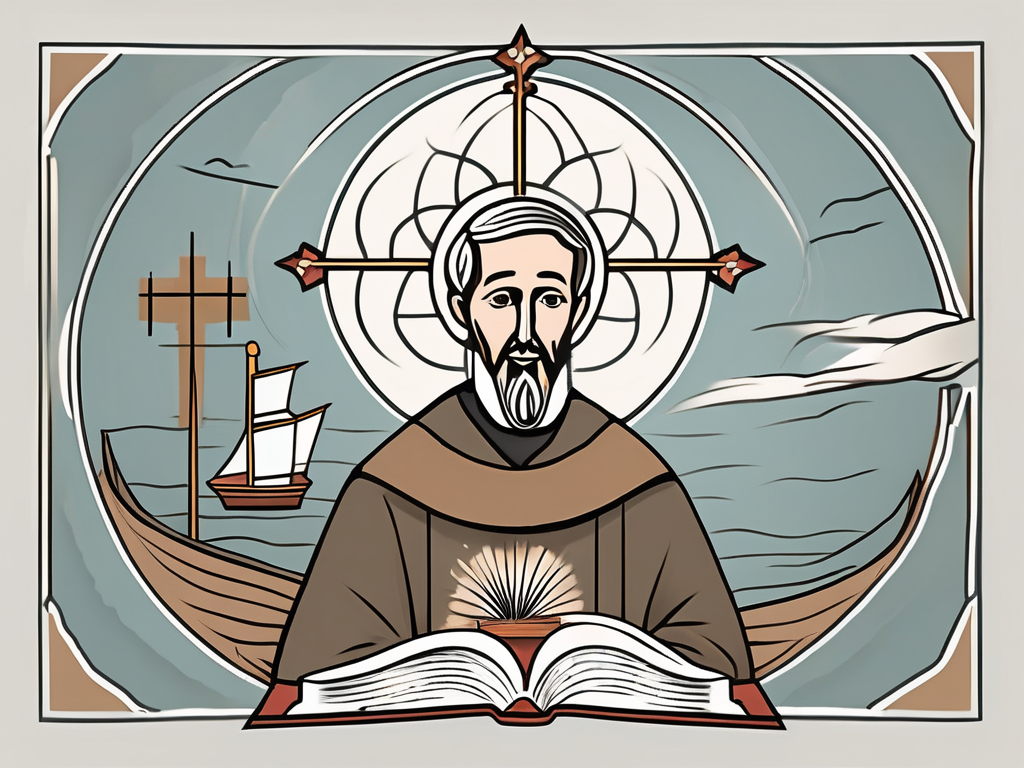Saint Frances Xavier Cabrini was a remarkable woman whose life and legacy continue to inspire people around the world. Born on July 15, 1850, in Sant’Angelo Lodigiano, Italy, she would go on to become the first naturalized citizen of the United States to be canonized as a saint by the Catholic Church. Let’s dive into her fascinating journey and explore the impact she had on the world.
Early Life and Education of Frances Xavier Cabrini
Frances Xavier Cabrini’s life began in humble circumstances. She was the youngest of thirteen children and grew up in a small farming village in Italy. Despite economic challenges, her parents provided her with a loving and nurturing home.
From a young age, Cabrini displayed a deep sense of spirituality and a desire to help others. Her religious education started early, receiving her First Communion at the age of seven. This marked the beginning of a lifelong devotion to her faith.
Frances Xavier Cabrini was born into a loving family in Sant’Angelo Lodigiano, a small town in Lombardy, Italy. Her parents, Stella and Agostino Cabrini, were devout Catholics who instilled strong values in their children.
Despite coming from a modest background, Cabrini’s parents emphasized the importance of education. They encouraged her to pursue her studies, even though opportunities for women were limited at that time.
As Cabrini grew older, her thirst for knowledge led her to study at a variety of institutions. She achieved excellent academic results and developed a passion for teaching and caring for others.
She initially wanted to become a teacher, but her spiritual calling became stronger. With the support of her parents, Cabrini embarked on a religious journey and joined the Missionary Sisters of the Sacred Heart of Jesus.
Joining the Missionary Sisters of the Sacred Heart of Jesus was a significant turning point in Cabrini’s life. It allowed her to combine her love for education and her deep faith in a meaningful way. The order was founded by Saint Frances Xavier Cabrini, who dedicated her life to serving the poor and marginalized.
As a member of the order, Cabrini underwent rigorous training in religious studies and missionary work. She learned about the importance of compassion, empathy, and social justice. These teachings shaped her future endeavors and fueled her passion for helping those in need.
Cabrini’s education and spiritual calling were intertwined. She saw education as a means to empower individuals and communities, enabling them to break free from the cycle of poverty and injustice. Her commitment to education extended beyond traditional classrooms, as she believed in the power of education to transform lives.
Throughout her life, Cabrini established numerous schools, orphanages, and hospitals, providing education and healthcare to those who were often neglected by society. She believed that everyone, regardless of their background, deserved access to quality education and healthcare.
Her dedication to her faith and her unwavering commitment to serving others earned her recognition and respect both within and outside the Catholic Church. She became the first American citizen to be canonized as a saint by the Catholic Church in 1946.
Frances Xavier Cabrini’s life serves as an inspiration to many, reminding us of the power of education, compassion, and faith. Her legacy lives on through the institutions she established and the lives she touched, continuing to make a difference in the world today.
The Journey to Sainthood
Cabrini’s commitment to her religious vocation led her to found the Missionary Sisters of the Sacred Heart in 1880. This marked the beginning of her extraordinary missionary work.
Cabrini’s journey towards sainthood was a testament to her unwavering dedication to serving others. Born in Italy in 1850, she felt a deep calling to devote her life to God and to help those in need. This calling led her to establish the Missionary Sisters of the Sacred Heart of Jesus, a congregation that would have a profound impact on countless lives.
Founding of the Missionary Sisters of the Sacred Heart
Driven by her deep compassion for others, Cabrini established the Missionary Sisters of the Sacred Heart of Jesus. The congregation grew rapidly, and soon they were opening schools, orphanages, and hospitals across Italy.
Cabrini’s vision for the Missionary Sisters of the Sacred Heart was rooted in love and compassion. She believed that every person, regardless of their social or economic status, deserved to be treated with kindness and dignity. This inclusive approach set the foundation for their future endeavors.
As the congregation expanded, Cabrini’s leadership and guidance became even more crucial. She instilled in her sisters a deep sense of purpose and a commitment to serving others selflessly. Together, they worked tirelessly to bring hope and healing to those in need.
Cabrini’s Missionary Work in America
While Cabrini’s initial intention was to travel to China as a missionary, Pope Leo XIII urged her to go to the United States. The massive influx of Italian immigrants in the late 19th century presented a substantial challenge.
Cabrini embraced this opportunity wholeheartedly. She arrived in New York City in 1889 and immediately began caring for the Italian immigrant community. She established schools, orphanages, and hospitals, providing much-needed support to those struggling in a foreign land.
Her work in America was not without its challenges. Cabrini faced discrimination and prejudice, but she remained steadfast in her mission. She tirelessly advocated for the rights and well-being of immigrants, fighting against the injustices they faced.
Miracles and Canonization
Cabrini’s life was marked by countless acts of extraordinary love and devotion. She performed miraculous healings and was regarded by many as a living saint. After her death, stories of miracles attributed to her intercession spread rapidly.
People from all walks of life sought Cabrini’s intercession and reported experiencing miraculous healings and interventions. Her reputation as a miracle worker grew, and her impact on the lives of those she touched was undeniable.
In recognition of her lifelong dedication to serving others, Cabrini was canonized as a saint by Pope Pius XII in 1946. She became the patron saint of immigrants due to her unwavering support and love for those in need.
Cabrini’s journey to sainthood serves as an inspiration to people around the world. Her selflessness, compassion, and unwavering faith continue to touch the lives of many. Through her example, she reminds us of the power of love and the importance of serving others with kindness and empathy.
Cabrini’s Legacy and Impact
Despite her passing over a century ago, Cabrini’s legacy continues to inspire and influence the world. Her contributions in various fields have left an indelible mark on society.
Contributions to Education and Healthcare
One of Cabrini’s most significant achievements was her establishment of schools and hospitals. She believed that education and healthcare were fundamental human rights that should be accessible to all.
Her dedication to providing quality education and healthcare, especially to marginalized communities, paved the way for countless individuals to lead better lives. Her institutions continue to provide vital services globally.
Honors and Memorials
The impact of Cabrini’s work has not gone unnoticed. Numerous schools, hospitals, and charitable organizations have been named in her honor as a testament to her tireless efforts.
Additionally, statues and monuments have been erected worldwide, paying tribute to her remarkable life. These serve as a reminder of the power of compassion and the importance of serving others selflessly.
Cabrini’s Influence on Modern Catholicism
Cabrini’s teachings and example have had a profound influence on modern Catholicism. She emphasized the importance of love, compassion, and service to others as central elements of the faith.
Her emphasis on inclusivity and social justice has resonated with many Catholics, inspiring them to take action in their own lives and communities. Cabrini’s legacy continues to shape the way many Catholics approach their faith.
Understanding Cabrini’s Teachings
Cabrini’s writings offer valuable insights into her beliefs and teachings. By exploring her key themes, we can gain a deeper understanding of her spiritual journey and the lessons she sought to impart.
Key Themes in Cabrini’s Writings
In her writings, Cabrini frequently discussed the importance of faith, love, and sacrifice. She believed that these virtues were the foundation of a meaningful and fulfilling life.
She also stressed the need for unity and collaboration, recognizing that true progress could only be achieved through working together for the common good.
Cabrini’s Views on Faith and Service
Cabrini saw faith as a transformative force that could inspire individuals to dedicate their lives to serving others. She believed that true faith necessitated action and encouraged her followers to live out their beliefs through acts of charity and love.
Reflections on Cabrini’s Life and Work
Cabrini’s life and work offer valuable lessons that remain relevant in today’s world. Her mission, compassion, and unwavering dedication to the betterment of society continue to inspire individuals from all walks of life.
Lessons from Cabrini’s Life
Cabrini’s life teaches us about the power of resilience and determination. Despite facing numerous obstacles, she remained committed to her calling and accomplished incredible feats.
Her life also serves as a reminder that one person can make a significant difference. Through her acts of love and kindness, Cabrini positively impacted the lives of countless individuals and left an enduring legacy.
Cabrini’s Relevance in Today’s World
In a world filled with division and strife, Cabrini’s message of love and inclusivity resonates deeply. Her example challenges us to see beyond differences and extend compassion to all.
Moreover, Cabrini’s emphasis on education and healthcare as basic human rights reminds us of our collective responsibility to create a just and equitable society.
As we reflect on the life and legacy of Saint Frances Xavier Cabrini, may we be inspired to follow in her footsteps and continue the work she began. Let us embrace compassion, serve others selflessly, and work tirelessly for the betterment of society.












